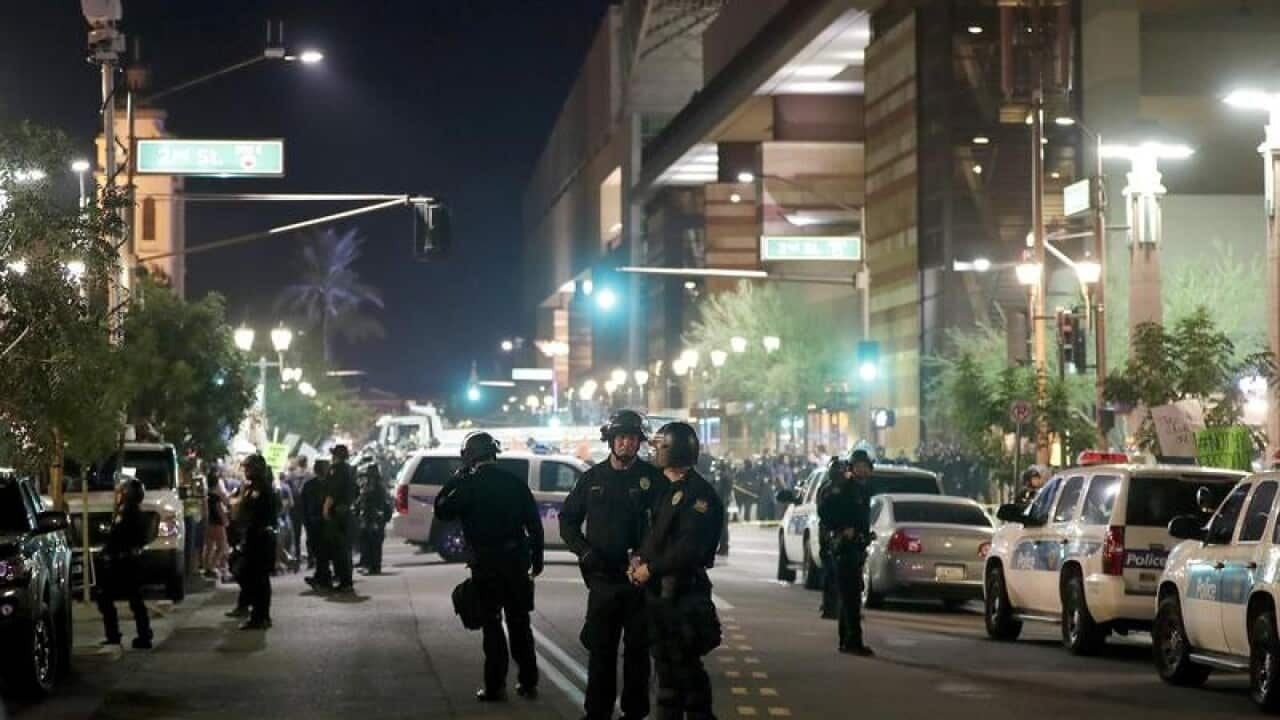President Trump faced bipartisan outrage after blaming "many sides" for violence at the rally in Charlottesville that took the life of an anti-fascist protester.
Re-reading his statements following the clashes at a rally in Phoenix, Arizona, he railed at reporters for misrepresenting his remarks - but omitted the equivocation that had sparked the backlash in the first place.
"The very dishonest media... and I mean truly dishonest people in the media and the fake media, they make up stories. They have no sources in many cases. They say a source says there is no such thing," he said.
"But they don't report the facts. Just like they don't want to report that I spoke out forcefully against hatred, bigotry and violence and strongly condemned the neo-Nazis, the white supremacists and the KKK."
Trump dedicated around half an hour of his 78-minute speech in Phoenix, Arizona, to attacking the "sick people" in the news media, before turning his fire on his own side.
Speculation had been building that Trump would use the rally to formally endorse a challenger to incumbent moderate Arizona Republican Senator Jeff Flake, in a shot across the bow of skeptical Republicans.
He mocked both Flake and fellow Arizona Republican senator John McCain, implying McCain had sabotaged Republican healthcare reforms, but elaborately avoided mentioning either by name.
'Something positive'
Veering off script, Trump shied away from issuing a pardon for Joe Arpaio - a former sheriff in Arizona who was convicted of willfully violating a court order to stop targeting Hispanics in immigration roundups.
But he gave strong hints that he was preparing a future pardon, saying: "I think he's going to be just fine, okay? I won't do it tonight because I don't want to cause any controversy."
White House press secretary Sarah Sanders had earlier told reporters there would be "no discussion" of Arpaio at the rally.

US President Donald Trump applauds the crowd of supporters at the Phoenix Convention Center as he takes the stage during a rally on August 22, 2017. Source: Getty
"I respect the fact that he is starting to respect us. And maybe - probably not, but maybe - something positive can come about," Trump said of North Korean leader Kim Jong Un, although the president repeated his opinion that he had not gone far enough in his condemnation of Kim.
The speech came at the end of a trip to Arizona the White House hopes will re-energize core supporters cooling to Trump's crisis-riddled presidency and build momentum for a controversial border wall.
The president began his day in Yuma, touring a US Border Patrol operations base, where he chatted with border agents. He traveled to Phoenix for the raucous campaign-style rally in the evening, introduced to the crowd by Vice President Mike Pence.
His visit to the Republican state aimed to tout the benefits of a border fence, turn up the heat on reluctant allies and demonstrate the president's determination to realize a central campaign pledge.
Trump made the case that a wall along the 2,000 mile (3,200 kilometer) desert-scarred frontier would stem the flow of migrants from the south.
Yuma "was once one of the least secure border areas in America (and) is now one of the most secure areas because of these investments in border security," a senior administration official said ahead of Trump's trip.
'Oppose Nazis'
Trump had insisted that Mexico will pay for the wall - estimated to cost about $22 billion.
Having failed in that bid, he has turned to equally reticent Republicans in Congress to get US funding.
With his plan running into political quicksand, Trump needs to generate public pressure on reluctant lawmakers to support him.
In Phoenix, Trump told the rally crowd his message for "obstructionist" Democrats was that he was building the wall "if we have to close down our government."
Thousands of pro and anti-Trump activists had lined up under a blistering sun in Phoenix hours before Trump's arrival, many wearing the stars and stripes, hoping to get into the conference center.
Facing a line of supporters stretching several hundred yards (meters), opponents of the president brandished placards including some that depicted him with a Hitler mustache.
"Things to do today: laundry, put out trash, oppose Nazis," said one sign.
A series of demonstrations backing immigrants and denouncing racism were planned in the center of Phoenix, a Democratic enclave in a state Trump narrowly won in the election.
A failure on the wall would be another setback for a president who has seen his message overshadowed by controversy and his agenda thwarted by legislative missteps.
A string of aides have departed the White House during Trump's seven months in office, including his chief of staff, two communications directors, a chief strategist and a press secretary.
Meanwhile, Republicans have become more vocal in their condemnation and polls show that Trump's approval rating stands at 35 percent -- a historical low level for a president in his first year in office.











